Namespace declaration for all of the Myra Canyon helper functions. More...
Namespaces | |
| L2 | |
| Layer 2 (ethernet). | |
| L3_ARP | |
| Layer 3 is ARP. | |
| L3_IP | |
| Layer 3 is either IPv4 or IPv6. | |
| L3_IPv4 | |
| Layer 3 is IPv4. | |
| L3_IPv6 | |
| Layer 3 is IPv6. | |
| L4_ICMP | |
| Definitions and helper functions for when layer 4 is ICMP. | |
| L4_ICMPv6 | |
| Definitions and helper functions for when layer 4 is ICMPv6. | |
| L4_TCP | |
| Definitions and helper functions for when layer 4 is TCP. | |
| L4_UDP | |
| Definitions and helper functions for when layer 4 is UDP. | |
| Session | |
| Manage session IDs. Used by the Myra Apache module to determine if a user has correctly logged in. | |
| Traffic | |
| Namespace to group everything related to network traffic. | |
Classes | |
| class | Addr6Port |
| Similar to AddrPort, but uses IPv6 addresses. More... | |
| class | AddrPort |
| This class exists mostly for the ability to easily sort addresses and ports numerically when creating hashes. More... | |
| class | Config |
| Class to manage all of configuration read from and written to JSON file. More... | |
| class | DB |
| Class DB is used to gain access to the database. More... | |
| class | Flow |
The Flow class represents both sides of a network connection. More... | |
| class | FlowExpectation |
The FlowExpectation class is used to insert hints that can link future or predicted flows with older existing flows. More... | |
| class | FlowStats |
| Statistics used by Myra::Flow. More... | |
| class | FlowTuple |
| A 5-tuple used to identify a network flow. More... | |
| class | Pkt |
| The Pkt class contains both the raw storage for all the bytes in the packet, as well as the information/analysis on the packet. More... | |
| class | PktInfo |
| The PktInfo class is meant to be easier to use than individually calling the L2 and L3 helper functions. More... | |
| class | Server |
| Class used to setup the entire Myra Canyon server framework. More... | |
Typedefs | |
| typedef std::queue< Pkt > | Packet_Queue |
| A queue (FIFO) of packets. More... | |
| typedef std::vector< uint8_t > | VBytes |
| Vector of bytes. (E.g., to use as a packet buffer.) More... | |
| typedef std::vector< std::string > | VStr |
| Vector of strings. More... | |
| typedef std::set< std::string > | SStr |
| Set of strings. More... | |
| typedef std::map< std::string, std::string > | MStr |
| Map of strings. More... | |
| typedef Json::Value | JSON |
| Easy to reference JSON object. More... | |
| typedef uint64_t | FlowHash |
| 64-bit hash calculated by Myra::hash(). More... | |
| typedef uint64_t | STAT |
| Type used for statistics. More... | |
| typedef std::set< FlowHash > | Hashes |
| Set of hashes. More... | |
| typedef int | FD |
| Native file descriptor. More... | |
| typedef boost::multiprecision::uint128_t | uint128_t |
| Unsigned 128-bit integer. More... | |
| typedef boost::multiprecision::int128_t | int128_t |
| Signed 128-bit integer. More... | |
| typedef boost::system::error_code | EC |
| boost system error code. More... | |
| typedef boost::asio::io_service | ASIO_IO_SERVICE |
| boost::asio's link to the operating system's I/O services. More... | |
| typedef boost::asio::posix::stream_descriptor | ASIO_STREAM |
| boost::asio's POSIX stream descriptor. More... | |
| typedef boost::asio::signal_set | ASIO_SIGNAL_SET |
| boost::asio's signal handling. More... | |
| typedef boost::asio::system_timer | ASIO_TIMER |
| boost::asio's timer support. More... | |
| typedef std::chrono::high_resolution_clock::time_point | TP |
| High resolution time point (aka "now"). More... | |
| typedef uint8_t | MAC [6] |
| MAC addresses. More... | |
| typedef uint32_t | IPv4_ADDR |
| 32-bit IPv4 addresses. More... | |
| typedef uint128_t | IPv6_ADDR |
| 128-bit IPv6 addresses. More... | |
| typedef uint16_t | PORT |
| 16-bit port. More... | |
| typedef PORT | TCP_PORT |
| 16-bit TCP port. More... | |
| typedef PORT | UDP_PORT |
| 16-bit UDP port. More... | |
| typedef std::map< IPv4_ADDR, std::string > | HostLookupMap |
| Map of address to hostname. More... | |
| typedef std::map < Myra::FlowHash, Myra::Flow > | FlowMap |
| A std::map of flows, where the key is the flow hash. More... | |
| typedef bool(* | TrafficExamination )(Flow &flow, const Myra::PktInfo &info) |
| A function that examines a packet as part of a flow. More... | |
| typedef std::vector < TrafficExamination > | TrafficExams |
| A vector of traffic examination functions. Used in Flow to call all relevant examination functions. More... | |
Functions | |
| std::string | to_string (const MAC &mac) |
| Format a MAC address for pretty-printing. More... | |
| std::string | to_string (const IPv4_ADDR &addr) |
| Format a IPv4 address for pretty-printing. More... | |
| std::string | to_string (const IPv6_ADDR &addr) |
| Format a IPv6 address for pretty-printing. More... | |
| IPv4_ADDR | ipv4_from_string (const std::string &str) |
| Convert a number-and-dots text string to a IPv4 address. More... | |
| IPv6_ADDR | ipv6_from_string (const std::string &str) |
| Myra::FlowHash | hash (const Myra::PktInfo &info) |
| Generate a 64-bit hash value. More... | |
| void | initialize_logging (void) |
| Initialize boost::log. More... | |
| void | initialize_file_logging (const std::string &filename) |
| Add the specified filename as a log sink. More... | |
| void | reset_logging (void) |
| Reset boost::log and disable logging. More... | |
| void | log_backtrace (void) |
| Log a line for every function name in the call stack. More... | |
| std::size_t | number_of_processing_units (void) |
| Get the number of processing units available. This returns the sum of CPUs, cores, hyperthreads, etc. More... | |
| VStr | run_command_and_get_vector (const std::string &cmd) |
| Run a command and get all of the output from STDOUT. More... | |
| std::string | run_command_and_get_string (const std::string &cmd) |
| Run a command and get all of the output from STDOUT. More... | |
| std::string | read_text_file (const std::string &filename) |
| Read an entire text file. More... | |
| void | write_file (const std::string &filename, const std::string &text) |
| Write a text file. This writes the file to a temporary location, then renames it to the requested name. More... | |
| bool | is_root (void) |
| Determine if we're running with root-level access. More... | |
| std::string | approximate_time (const time_t tt) |
| Build a text string that tells us approximately when a specific event took place. More... | |
| std::string | approximate_time (const TP &when) |
| Similar to the other approximate_time() function, but takes a TP reference. More... | |
| std::string | cpp_demangle (const std::string &str) |
| Demangle the given C++ name. This is compiler-specific. More... | |
| FD | create_pid_lockfile (const std::string &name) |
| Create a PID lock file. This creates and places an exclusive lock on a PID file in /var/run/. More... | |
| void | release_pid_lockfile (FD &pid_fd) |
| Release the PID lock file. This unlocks the file in /var/run/ created by create_pid_lockfile(). More... | |
| std::string | hex_out (const std::string &str, const int number_of_rows_to_display=4) |
| Produce hex output for the given data. More... | |
| std::string | hex_out (const uint8_t *data, const size_t len, const int number_of_rows_to_display=4) |
| std::string | format_SI_or_IEC (const long double &bytes, std::string &postfix, const int divider) |
| } More... | |
| std::string | format_bytes_SI (const uint64_t &bytes) |
| std::string | format_bytes_IEC (const uint64_t &bytes) |
| std::string | format_bps (const uint64_t &bytes, std::size_t seconds) |
| std::string & | ltrim (std::string &str) |
| Trim whitespace from string. More... | |
| std::string & | rtrim (std::string &str) |
| std::string | ltrim (const std::string &str) |
| std::string | rtrim (const std::string &str) |
| std::string | trim (const std::string &str) |
| Trim whitespace from string. More... | |
| std::string & | trim (std::string &str) |
| Trim whitespace from string. More... | |
Variables | |
| constexpr std::size_t | KiB = 1024 |
kibibyte (10 bits) 1024 More... | |
| constexpr std::size_t | MiB = 1024 * KiB |
mebibyte (20 bits) 1048576 More... | |
| constexpr std::size_t | GiB = 1024 * MiB |
gibibyte (30 bits) 1073741824 More... | |
| constexpr std::size_t | TiB = 1024 * GiB |
tebibyte (40 bits) 1099511627776 More... | |
| constexpr std::size_t | PiB = 1024 * TiB |
pebibyte (50 bits) 1125899906842624 More... | |
| constexpr std::size_t | EiB = 1024 * PiB |
exbibyte (60 bits) 1152921505606846976 More... | |
| constexpr std::size_t | ZiB = 1024 * EiB |
zebibyte (70 bits) 1180591620717411303424 More... | |
| constexpr std::size_t | YiB = 1024 * ZiB |
yobibyte (80 bits) 1208925819614629174706176 More... | |
| constexpr std::size_t | KB = 1000 |
kilobyte 1000 More... | |
| constexpr std::size_t | MB = 1000 * KB |
megabyte 1000000 More... | |
| constexpr std::size_t | GB = 1000 * MB |
gigabyte 1000000000 More... | |
| constexpr std::size_t | TB = 1000 * GB |
terabyte 1000000000000 More... | |
| constexpr std::size_t | PB = 1000 * TB |
petabyte 1000000000000000 More... | |
| constexpr std::size_t | EB = 1000 * PB |
exabyte 1000000000000000000 More... | |
| constexpr std::size_t | ZB = 1000 * EB |
zetabyte 1000000000000000000000 More... | |
| constexpr std::size_t | YB = 1000 * ZB |
yotabyte 1000000000000000000000000 More... | |
| constexpr std::size_t | Seconds = 1 |
| constexpr std::size_t | Minutes = 60 * Seconds |
| constexpr std::size_t | Hours = 60 * Minutes |
| constexpr std::size_t | Days = 24 * Hours |
| constexpr std::size_t | Weeks = 7 * Days |
| constexpr std::size_t | Years = 365.24 * Days |
| constexpr std::size_t | Months = Years / 12 |
Namespace declaration for all of the Myra Canyon helper functions.
| typedef boost::asio::io_service Myra::ASIO_IO_SERVICE |
boost::asio's link to the operating system's I/O services.
| typedef boost::asio::signal_set Myra::ASIO_SIGNAL_SET |
boost::asio's signal handling.
| typedef boost::asio::posix::stream_descriptor Myra::ASIO_STREAM |
boost::asio's POSIX stream descriptor.
| typedef boost::asio::system_timer Myra::ASIO_TIMER |
boost::asio's timer support.
| typedef boost::system::error_code Myra::EC |
boost system error code.
| typedef int Myra::FD |
Native file descriptor.
| typedef uint64_t Myra::FlowHash |
64-bit hash calculated by Myra::hash().
| typedef std::map<Myra::FlowHash, Myra::Flow> Myra::FlowMap |
A std::map of flows, where the key is the flow hash.
| typedef std::set<FlowHash> Myra::Hashes |
Set of hashes.
| typedef std::map<IPv4_ADDR, std::string> Myra::HostLookupMap |
Map of address to hostname.
| typedef boost::multiprecision::int128_t Myra::int128_t |
Signed 128-bit integer.
| typedef uint32_t Myra::IPv4_ADDR |
32-bit IPv4 addresses.
| typedef uint128_t Myra::IPv6_ADDR |
128-bit IPv6 addresses.
| typedef Json::Value Myra::JSON |
Easy to reference JSON object.
| typedef uint8_t Myra::MAC[6] |
MAC addresses.
| typedef std::map<std::string, std::string> Myra::MStr |
Map of strings.
| typedef std::queue<Pkt> Myra::Packet_Queue |
A queue (FIFO) of packets.
| typedef uint16_t Myra::PORT |
16-bit port.
| typedef std::set<std::string> Myra::SStr |
Set of strings.
| typedef uint64_t Myra::STAT |
Type used for statistics.
| typedef PORT Myra::TCP_PORT |
16-bit TCP port.
| typedef std::chrono::high_resolution_clock::time_point Myra::TP |
High resolution time point (aka "now").
| typedef bool(* Myra::TrafficExamination)(Flow &flow, const Myra::PktInfo &info) |
A function that examines a packet as part of a flow.
true if it needs to be called again with another packet false if it should never be called again (wrong type of traffic) | typedef std::vector<TrafficExamination> Myra::TrafficExams |
A vector of traffic examination functions. Used in Flow to call all relevant examination functions.
| typedef PORT Myra::UDP_PORT |
16-bit UDP port.
| typedef boost::multiprecision::uint128_t Myra::uint128_t |
Unsigned 128-bit integer.
| typedef std::vector<uint8_t> Myra::VBytes |
Vector of bytes. (E.g., to use as a packet buffer.)
| typedef std::vector<std::string> Myra::VStr |
Vector of strings.
| std::string Myra::approximate_time | ( | const time_t | tt | ) |
Build a text string that tells us approximately when a specific event took place.
| [in] | tt | absolute time since the unix epoch (1970-01-01 00:00:00) |
Examples of some output this function produces:
23 seconds ago 4 hours ago in 6 weeks
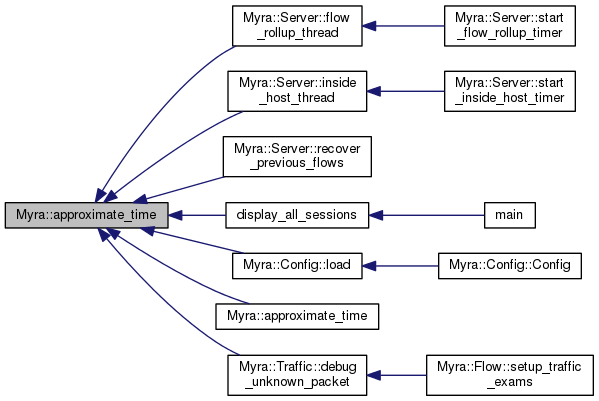
| std::string Myra::approximate_time | ( | const TP & | when | ) |
Similar to the other approximate_time() function, but takes a TP reference.

| std::string Myra::cpp_demangle | ( | const std::string & | str | ) |
Demangle the given C++ name. This is compiler-specific.

| Myra::FD Myra::create_pid_lockfile | ( | const std::string & | name | ) |
Create a PID lock file. This creates and places an exclusive lock on a PID file in /var/run/.
| [in] | name | is the name to use when creating the PID lock file (usually the process name) |
/var/run/ 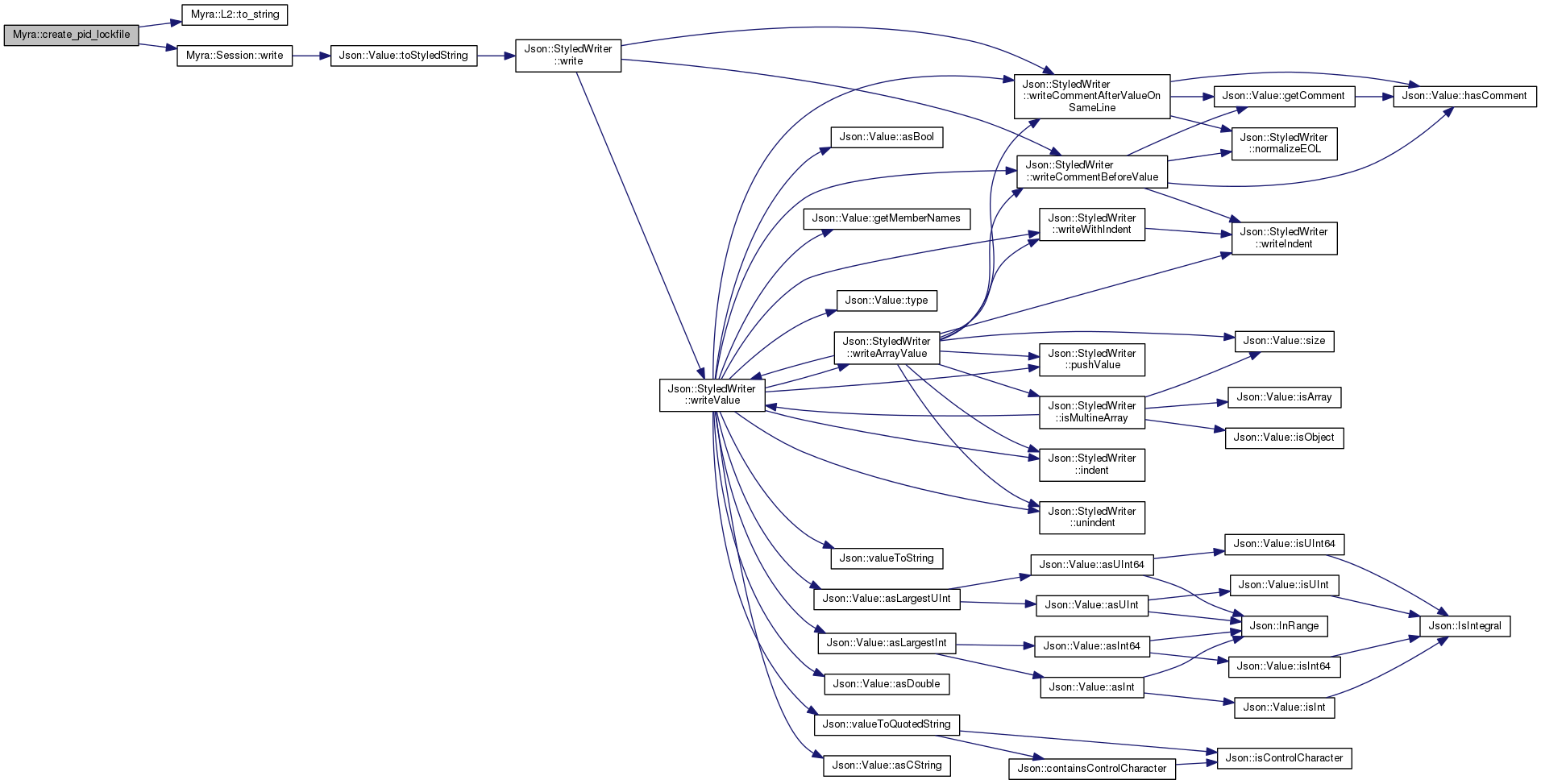

| std::string Myra::format_bps | ( | const uint64_t & | bytes, |
| std::size_t | seconds | ||
| ) |
| [in] | bytes | total number of bytes transferred |
| [in] | seconds | the length of time (in seconds) of the period over which the transferred was measured |
Network speed always uses decimal (SI) formatting.
For example:
| Value | Seconds | Output |
|---|---|---|
| 1000 | 1 | 1.00 KBps [8.00 Kbps] |
| 12345 | 10 | 1.23 KBps [9.88 Kbps] |
| 987654321 | 60 | 16.46 MBps [131.69 Mbps] |

| std::string Myra::format_bytes_IEC | ( | const uint64_t & | bytes | ) |
For example:
| Input | Output |
|---|---|
| 1000 | 0.98 KiB |
| 1024 | 1.00 KiB |


| std::string Myra::format_bytes_SI | ( | const uint64_t & | bytes | ) |
For example:
| Input | Output |
|---|---|
| 1000 | 1.00 KB |
| 1024 | 1.02 KB |

| std::string Myra::format_SI_or_IEC | ( | const long double & | bytes, |
| std::string & | postfix, | ||
| const int | divider | ||
| ) |
}
Format the value similar to KBytes or KBytes/sec.

| Myra::FlowHash Myra::hash | ( | const Myra::PktInfo & | info | ) |
Generate a 64-bit hash value.
Not all packets will generate a hash. Only packets we expect to "follow" will generate a hash. For example, a one-shot ICMP message wont hash, while a TCP or UDP packet will hash.
When a packet cannot hash, a value of zero will be returned.
Here is what we use to generate a network traffic flow:
addr1: 32 bits
addr2: 32 bits
port1: 16 bits
port2: 16 bits
ethertype: 8 bits
protocol: 8 bits
--------
TOTAL: 112 bits
UNUSED BITS: 16 bits
And even then, the ethertype and protocol fields don't provide that many bits of variability, but we're going to ignore that, or at least reduce the impact by spreading out the fields so the ones with the most variability (port1 and port2) are at opposite ends of the value. The 16 remaining empty/unused bits will be filled with a 2nd copy of port1, which is more helpful than having 16 bits always set to zero.
The 128-bit value to hash is composed like this:
bits 0-15 [16 bits]: port 1
bits 16-23 [ 8 bits]: protocol
bits 24-55 [32 bits]: addr 1
bits 56-63 [ 8 bits]: ethertype
bits 64-95 [32 bits]: addr 2
bits 96-111 [16 bits]: port 2
bits 112-127 [16 bits]: port 1 (again)
The actual algorithm which takes the 128-bit value and produces a 64-bit hash comes from the Hash128to64() function in the MIT-licensed FarmHash project, which in turn was Murmur-inspired.
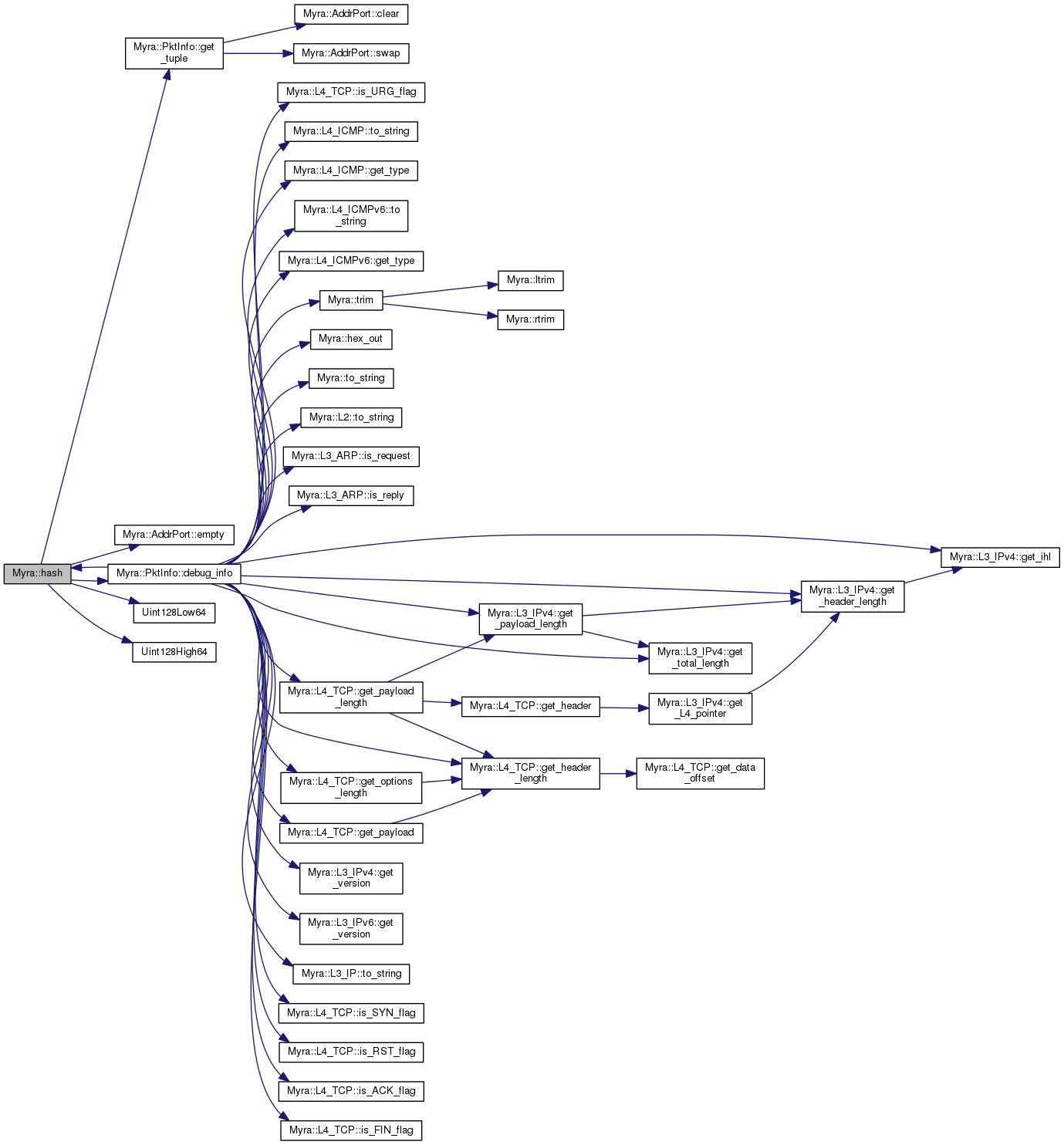
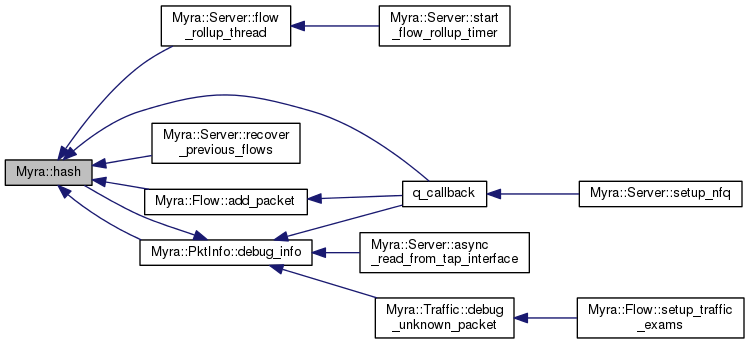
| std::string Myra::hex_out | ( | const std::string & | str, |
| const int | number_of_rows_to_display = 4 |
||
| ) |
Produce hex output for the given data.

| std::string Myra::hex_out | ( | const uint8_t * | data, |
| const size_t | len, | ||
| const int | number_of_rows_to_display = 4 |
||
| ) |
If number_of_rows_to_display is set to 1 or less, then all rows will be shown without skipping. Otherwise, the middle section of large buffers will be skipped to reduce the number of lines logged, keeping both the start and end of the buffer intact.
| void Myra::initialize_file_logging | ( | const std::string & | filename | ) |
Add the specified filename as a log sink.

| void Myra::initialize_logging | ( | void | ) |
Initialize boost::log.

| Myra::IPv4_ADDR Myra::ipv4_from_string | ( | const std::string & | str | ) |
Convert a number-and-dots text string to a IPv4 address.

| Myra::IPv6_ADDR Myra::ipv6_from_string | ( | const std::string & | str | ) |
| bool Myra::is_root | ( | void | ) |
Determine if we're running with root-level access.
false if the current user isn't roottrue if the user id or effective user id is zero (root) 
| void Myra::log_backtrace | ( | void | ) |
Log a line for every function name in the call stack.

| std::string & Myra::ltrim | ( | std::string & | str | ) |
Trim whitespace from string.
This modifies the original string.

| std::string Myra::ltrim | ( | const std::string & | str | ) |
A new string is created, trimmed, and returned. The original string remains untouched.

| std::size_t Myra::number_of_processing_units | ( | void | ) |
Get the number of processing units available. This returns the sum of CPUs, cores, hyperthreads, etc.
| std::string Myra::read_text_file | ( | const std::string & | filename | ) |
Read an entire text file.

| void Myra::release_pid_lockfile | ( | FD & | pid_fd | ) |
Release the PID lock file. This unlocks the file in /var/run/ created by create_pid_lockfile().
| [in,out] | pid_fd | is the open PID file descriptor previously obtained from Myra::create_pid_lockfile(). It is automatically cleared (set to -1) once the PID lock file has been unlocked, closed, and deleted. |


| void Myra::reset_logging | ( | void | ) |
Reset boost::log and disable logging.

| std::string & Myra::rtrim | ( | std::string & | str | ) |
This modifies the original string.

| std::string Myra::rtrim | ( | const std::string & | str | ) |
A new string is created, trimmed, and returned. The original string remains untouched.

| std::string Myra::run_command_and_get_string | ( | const std::string & | cmd | ) |
Run a command and get all of the output from STDOUT.

| Myra::VStr Myra::run_command_and_get_vector | ( | const std::string & | cmd | ) |
Run a command and get all of the output from STDOUT.

| std::string Myra::to_string | ( | const MAC & | mac | ) |
Format a MAC address for pretty-printing.
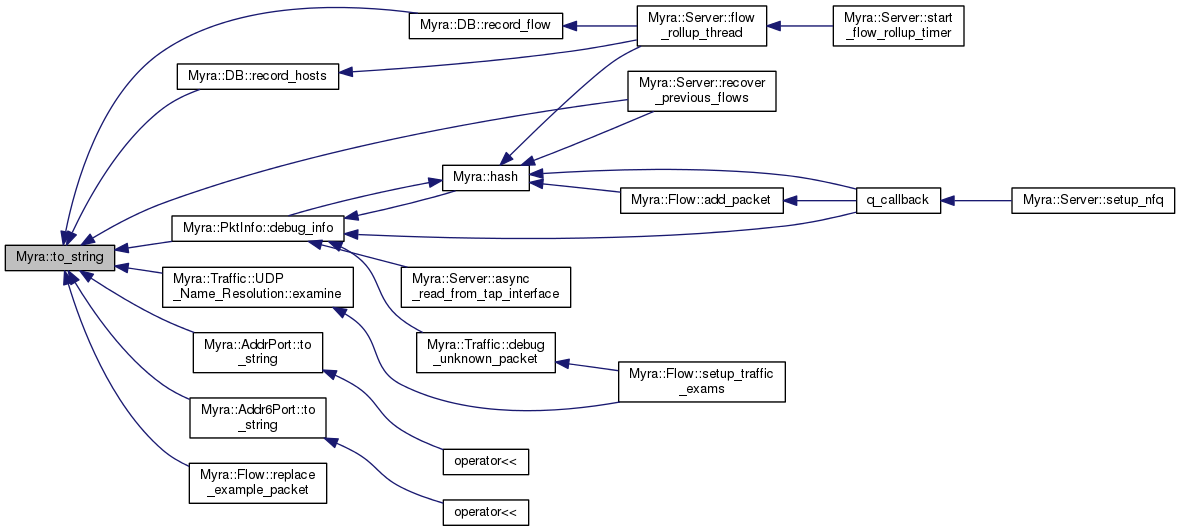
| std::string Myra::to_string | ( | const IPv4_ADDR & | addr | ) |
Format a IPv4 address for pretty-printing.
| std::string Myra::to_string | ( | const IPv6_ADDR & | addr | ) |
Format a IPv6 address for pretty-printing.
|
inline |
Trim whitespace from string.
This modifies the original string.


|
inline |
Trim whitespace from string.
This modifies the original string.

| void Myra::write_file | ( | const std::string & | filename, |
| const std::string & | text | ||
| ) |
Write a text file. This writes the file to a temporary location, then renames it to the requested name.


| constexpr std::size_t Myra::Days = 24 * Hours |
| constexpr std::size_t Myra::EB = 1000 * PB |
exabyte 1000000000000000000
| constexpr std::size_t Myra::EiB = 1024 * PiB |
exbibyte (60 bits) 1152921505606846976
| constexpr std::size_t Myra::GB = 1000 * MB |
gigabyte 1000000000
| constexpr std::size_t Myra::GiB = 1024 * MiB |
gibibyte (30 bits) 1073741824
| constexpr std::size_t Myra::Hours = 60 * Minutes |
| constexpr std::size_t Myra::KB = 1000 |
kilobyte 1000
| constexpr std::size_t Myra::KiB = 1024 |
kibibyte (10 bits) 1024
| constexpr std::size_t Myra::MB = 1000 * KB |
megabyte 1000000
| constexpr std::size_t Myra::MiB = 1024 * KiB |
mebibyte (20 bits) 1048576
| constexpr std::size_t Myra::Minutes = 60 * Seconds |
| constexpr std::size_t Myra::Months = Years / 12 |
| constexpr std::size_t Myra::PB = 1000 * TB |
petabyte 1000000000000000
| constexpr std::size_t Myra::PiB = 1024 * TiB |
pebibyte (50 bits) 1125899906842624
| constexpr std::size_t Myra::Seconds = 1 |
| constexpr std::size_t Myra::TB = 1000 * GB |
terabyte 1000000000000
| constexpr std::size_t Myra::TiB = 1024 * GiB |
tebibyte (40 bits) 1099511627776
| constexpr std::size_t Myra::Weeks = 7 * Days |
| constexpr std::size_t Myra::YB = 1000 * ZB |
yotabyte 1000000000000000000000000
| constexpr std::size_t Myra::Years = 365.24 * Days |
| constexpr std::size_t Myra::YiB = 1024 * ZiB |
yobibyte (80 bits) 1208925819614629174706176
| constexpr std::size_t Myra::ZB = 1000 * EB |
zetabyte 1000000000000000000000
| constexpr std::size_t Myra::ZiB = 1024 * EiB |
zebibyte (70 bits) 1180591620717411303424